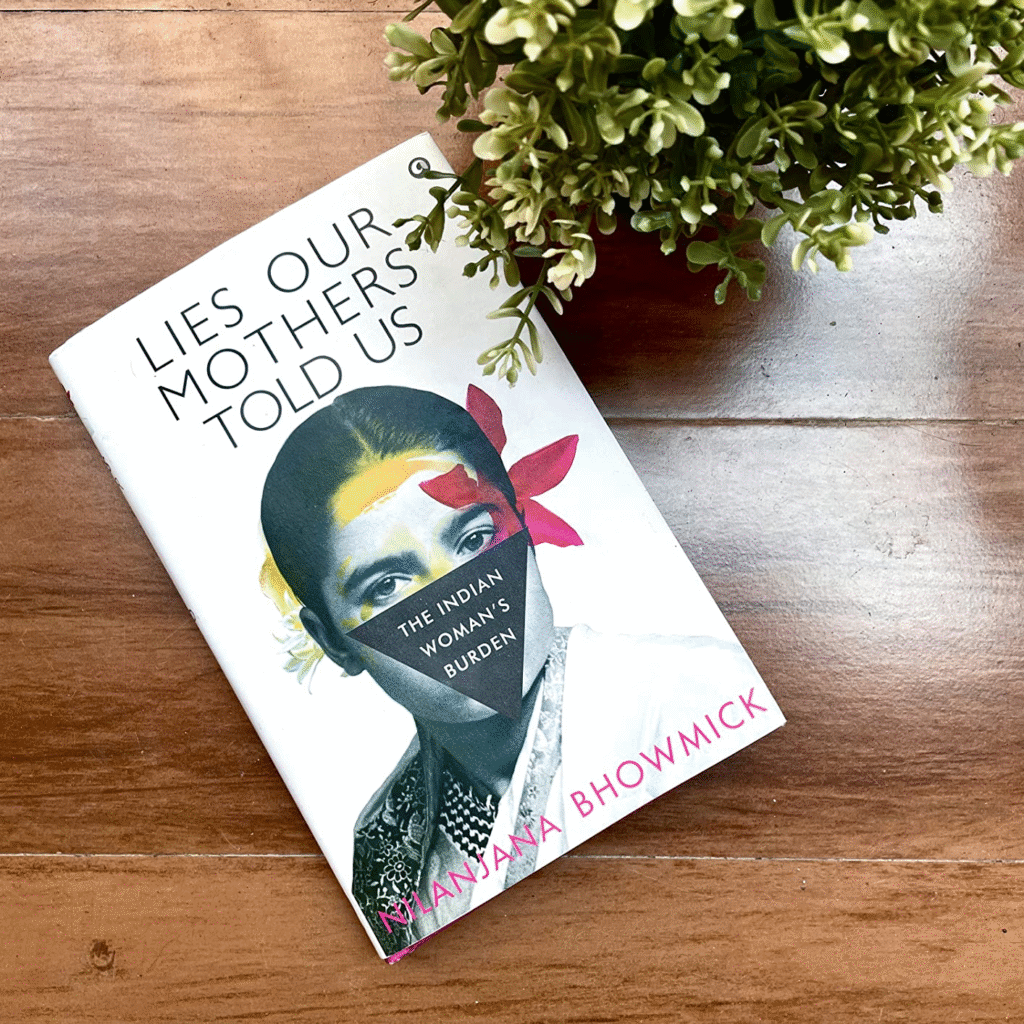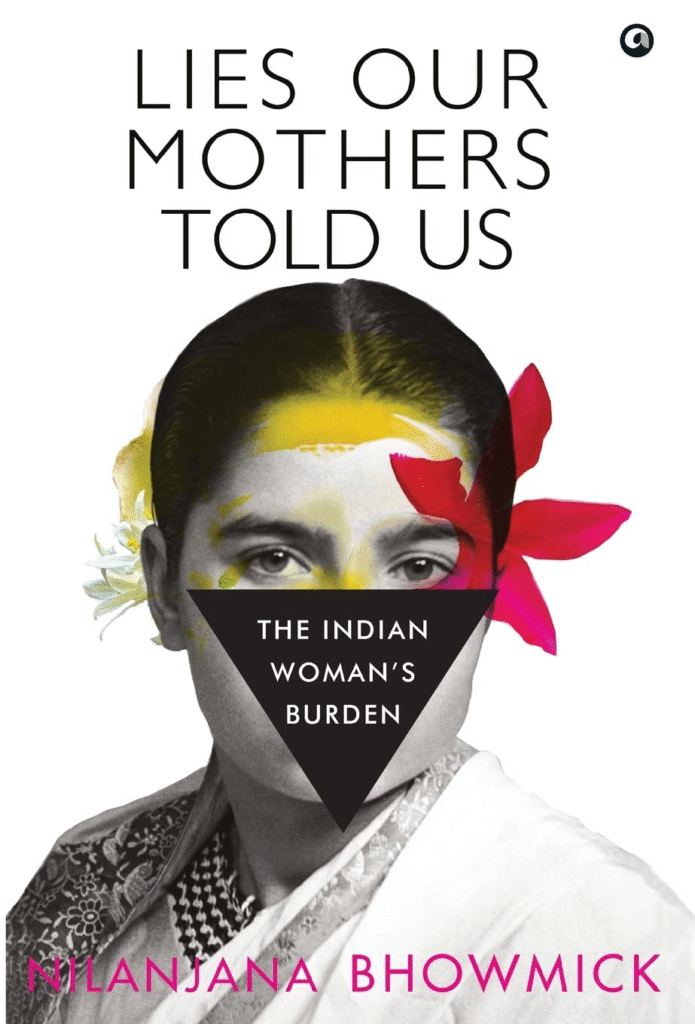Nilanjana Bhowmick’s powerful book, Lies Our Mothers Told Us: The Indian Woman’s Burden, shines a light on the silent yet pervasive struggles of Indian women, particularly within the middle class. The book dissects how systemic gender inequality, masked by a facade of progressiveness, continues to burden women with the expectation of balancing professional careers and domestic responsibilities, often at the cost of their mental and physical well-being.
Drawing from real-life anecdotes and statistical data, Lies Our Mothers Told Us delves into issues like child marriages, dowry deaths, gendered domestic work, and the “double shift” women endure. Bhowmick questions the widely accepted notion that “women can have it all” in a patriarchal society where such aspirations come at an enormous personal cost.

Since the 19th century, women like Savitribai Phule, Mahasweta Devi, Amrita Pritam, Medha Patkar, and Kamla Bhasin have worked hard to get equal rights for Indian women. Their efforts helped win important rights like voting, owning property, equal pay, and protection from harassment at work. These feminists hoped their daughters and granddaughters would enjoy successful careers, contribute to society, gain financial independence, and have equal relationships in marriage. But even today, patriarchy and the pressures of modern life make Indian women’s lives unfair and exhausting.
Indian women do more unpaid work than almost anyone else in the world. On average, they spend 299 minutes daily on housework and 134 minutes caring for family doing 82% of all domestic work. Many girls are expected to help at home from a young age, forcing them to leave school, quit jobs, and give up on independence. Women who do have careers often work a “double shift,” managing both jobs and household duties. Lies Our Mothers Told Us focuses on how this unfairness is even worse for middle-class women, who are expected to act like “superwomen” while ignoring the effects on their health. Journalist Nilanjana Bhowmick uses real-life stories and facts to show how society’s idea that “women can have it all” comes at a heavy price.
Through its compelling prose, Lies Our Mothers Told Us becomes more than just a critique—it is a rallying cry for change. The book challenges readers to recognize the deeply entrenched norms that perpetuate gender inequality and inspires hope for a future where women can truly achieve freedom and equality.
Availability & Details of book

Lies Our Mothers Told Us: The Indian Woman’s Burden by Nilanjana Bhowmick is available in English and was published on July 5, 2022, by Aleph Book Company. This book is available in both hardcover and Kindle formats. The hardcover version is priced at ₹588, while the Kindle version costs ₹451. It can be purchased on various platforms, including Amazon, Goodreads and Flipkart. With 272 pages, this book delves into the challenges and inequalities faced by women in India, offering a powerful blend of personal stories and statistical insights. It is a must-read for those who want to understand the real struggles of Indian women today. The book is available for purchase online through various platforms. Choosing the Kindle version might be a great option if you prefer reading digitally, as it is more affordable and accessible on your phone, tablet, or e-reader.
Themes Explored in Lies Our Mothers Told Us
- Patriarchy in the Family: In Lies Our Mothers Told Us, the author highlights how deeply rooted patriarchy affects Indian households. Women are often expected to bear the burden of caregiving, housework, and family responsibilities while being denied equal treatment and opportunities. This toxic system pressures women to act as superwomen, managing everything without support, which harms their physical and mental health.
- The ‘Superwoman’ Complex: The book emphasizes the societal expectation for women to excel at their careers while also being perfect homemakers. In Lies Our Mothers Told Us, Nilanjana Bhowmick discusses how this unrealistic standard creates stress and exhaustion for women, particularly those in middle-class families, who receive little help from their spouses.
- Gender Inequality at Work: The author points out the challenges faced by working women in Lies Our Mothers Told Us. Women often face workplace discrimination, unequal pay, and limited opportunities for growth. This inequality persists despite progress made on paper, like equal remuneration laws.
- Unpaid Domestic Work: Lies Our Mothers Told Us reveals shocking statistics about how women spend an average of 299 minutes daily on housework and caregiving, often while holding full-time jobs. This unpaid labour is largely ignored and undervalued, leaving women with little time for themselves or personal development.
- Impact of Capitalism and Gender Roles: In Lies Our Mothers Told Us, Nilanjana Bhowmick discusses how capitalism exploits women by assigning them unpaid caregiving roles while expecting them to contribute to the economy. This double burden stems from outdated gender roles, which continue to control women’s lives.
- Education and Dropouts Among Girls: The book sheds light on the high dropout rates among girls in India, as highlighted in Lies Our Mothers Told Us. Many girls leave school to support their families, either by working in the fields or helping with household chores, which limits their chances of achieving independence despite policies like the Right to Education Act, girls often drop out of school to assist with in the work. This perpetuates the cycle of gender inequality, limiting opportunities for economic independence.
- Violence Against Women: Lies Our Mothers Told Us addresses grim realities such as domestic violence, dowry-related deaths, and marital rape. The book reminds readers that despite advancements in women’s rights, these issues remain prevalent in Indian society.
- Challenges of Modern Feminism: In Lies Our Mothers Told Us, the author explores how modern feminism often overlooks the struggles of middle-class women. These women are expected to balance traditional roles with modern ambitions, but societal support for this transition is lacking.
- Intersectionality of Caste and Gender: The book highlights how caste and economic backgrounds worsen gender inequality. Lies Our Mothers Told Us discusses how women from marginalized communities often face exploitation in domestic labour due to unequal power dynamics and low wages. Women from lower economic backgrounds face additional challenges, including exploitation in informal employment sectors.
- Silent Battles of Middle-Class Women: Lies Our Mothers Told Us highlights the emotional and psychological toll on middle-class Indian women who are caught between societal expectations and their aspirations. Women endure silent battles, suppressing their dreams and struggles to maintain societal harmony. The book reveals how this facade often masks a life of compromises and sacrifices.
- Burden of Traditional Parenting Norms: The book explores how parenting roles are deeply gendered. Fathers often remain distant from household and caregiving responsibilities, while mothers are expected to carry the full emotional and physical load. Lies Our Mothers Told Us points out how this uneven distribution of duties perpetuates patriarchal norms across generations.
- Gendered Safety Concerns in Public Spaces: The book emphasizes how the safety of women in public spaces remains a critical issue. Women must constantly modify their behavior whether by dressing conservatively, avoiding night shifts, or staying on the phone while commuting highlighting the persistent lack of freedom in everyday life.
- Toxic Marital Dynamics: Lies Our Mothers Told Us delves into the toxic dynamics of marriages, where women are expected to endure emotional, physical, or financial abuse for the sake of family reputation. The book critiques societal pressure that prevents women from leaving abusive relationships, presenting true accounts to highlight this issue.
- Incremental Progress and Hope for Change: Despite the grim realities, the author concludes Lies Our Mothers Told Us on a hopeful note. It acknowledges that societal norms are slowly changing, with more women choosing to walk out of toxic marriages and raising their children both sons and daughters with values of compassion, independence, and equality. The book reminds readers that progress is possible with collective efforts.
These themes make Lies Our Mothers Told Us an insightful read, shining a light on the struggles of Indian women while calling for systemic and societal change to achieve genuine gender equality.
Excerpts from Lies Our Mothers Told Us
- “Gender equality is a human fight, not a gender fight.”
This line from Lies Our Mothers Told Us explains that gender equality is not just about women fighting for their rights it is a shared responsibility of all humans, regardless of gender. True equality can only happen when men and women work together to challenge unfair norms and practices.
- “I thought my mother had it all. That was a lie. She made me believe the world would be fairer and more equal for women when I grew up—that I could have it all. That was a lie, too.”
This thought highlights the disillusionment many women feel. The author reflects on the false promises passed down by previous generations, where women were told they could achieve everything career success, family happiness, and independence but were not prepared for the harsh realities of societal expectations and patriarchal constraints. Lies Our Mothers Told Us uses these reflections to show how the struggle for equality continues to be challenging and far from resolved.
These ideas underscore the need for collective change and honest conversations about the inequalities women still face today.
Lies Our Mothers Told Us raises important questions about the lives of women and girls both inside and outside the home. It makes you think about whether we truly give women equal rights and whether they even have the freedom to ask for something as simple as a glass of water. Many women are trapped in a cycle of child care, caregiving, and housework, which often leaves them feeling invisible and unheard. Some women may not even feel comfortable asking their husbands to share household chores.
The book also questions whether government schemes like Beti Bachao Beti Padhao, Sukanya Samriddhi, and Jan Dhan Yojana are truly benefiting women or if they are just used as tokens for publicity. Lies Our Mothers Told Us dives into these topics, backed by real data and examples, to provide answers and challenge the way we think about gender equality. Reading this book will give you an eye-opening experience and encourage you to reflect on these pressing issues.
Why Every Woman Should Read and Buy: Lies Our Mothers Told Us
Lies Our Mothers Told Us is a must-read for every woman, and it’s a book you should consider gifting to your daughter or daughter-in-law. It highlights numerous facts, harsh realities, and ironies that women experience but often do not talk about. The book brings to light the issues that are usually ignored or brushed under the rug in society and at home. These are the things we often overlook, yet many of us have lived through similar experiences.
By reading this book, you will realize that you are not alone in your struggles and emotions. It validates your feelings and shows that it is okay to feel the way you do. The author takes readers on an emotional and eye-opening journey through the lives of women in modern India, tackling the complexities of family dynamics, societal pressures, and the deep-rooted influence of patriarchy. With her sharp journalistic perspective and empathetic storytelling, Nilanjana Bhowmick opens your eyes to the challenges that women face, offering insight and understanding that many women need but seldom receive. The criticism is valid, it often makes it hard to see the situation from a broader, societal perspective. However, the author does a fantastic job of combining emotional insights, mental struggles, and statistical facts to present a full picture of the issue. This makes the book not just personal but also informative.
I would recommend this book for everyone to read, and it would be especially valuable if you pass it along to the men in your life as well. It helps everyone understand the challenges women face and gives a deeper perspective on gender inequality in society.
Final Thoughts
Lies Our Mothers Told Us is a powerful and eye-opening book that sheds light on the struggles of women in India. It blends personal stories, emotional experiences, and hard facts to show the deep-rooted issues of patriarchy and gender inequality. The book encourages women to realize that they are not alone in their feelings and struggles. It also urges everyone, including men, to reflect on these societal problems and work towards change. This book is a must-read for anyone who wants to understand the reality of women’s lives and the importance of true gender equality.




